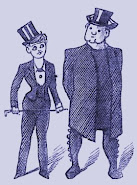There is scarcely a writer at the present day, I believe, connected with the periodical press, but who has written picturesque, humorous, or descriptive sketches, upon the sights, characters and curiosities, natural and physical, of the Great Metropolis, the Great Wen, the Modern Babylon, the World of London, the Giant City, the Monster Metropolis, the Nineveh of the nineteenth century, etcetera, etcetera, etcetera. — Curiosities of London, in Household Words, June 23, 1855
ROBERT J. KIRKPATRICK’s new information-packed book Pennies, Profits and Poverty; A Biographical Directory of Wealth and Want in Bohemian Fleet Street is an arresting account of the lives, trials and tribulations of the publishers and authors who roamed Fleet Street and environs in the nineteenth century. A small part of this book appeared originally in posts published on Yesterday’s Papers and Steve Holland’s Bear Alley. Those posts have been expanded by Kirkpatrick. Much new biographical material is also added with the aid of digital newspapers, genealogical sites, and the hitherto almost untouched archives of the Victorian era Royal Literary Fund set up in 1773 to provide aid to the beggared and the destitute.
HIS FOCUS is on the contrast of wealth and poverty among the habitués of subliterary London who produced cheap radical newspapers, comic periodicals, domestic romances, boys’ weeklies and sensational literature for the amusement of what was generally referred to among the educated classes as “the mob” or “the million.”
SOME 150 LIVES and finances of publishers and authors are examined in depth. The first part, PUBLISHERS AND PROFITS, begins with the radical publishers of the penny press, among them the Duncombes, Henry Hetherington, James Watson, John Cleave, William Strange and the arch-pornographer William Dugdale. All of the publishers of penny bloods, major and minor are represented; Lloyd, Clark, Pattie, Clements, Caffyn, Pierce, Dipple, Harrison and John Dicks. Moving into the period of the boys’ weeklies and penny dreadfuls we are introduced to Brett, Fox, Ritchie, Lucas, Farrah, Allingham, the Shureys and Alfred Harmsworth.
HACKS AND HANDOUTS, the title of Part II, examines the often precarious lives of the scribblers Pierce Egan, Hannah Maria Jones, Henry Downes Miles, G.W.M. Reynolds, John Frederick Smith, Thomas Peckett Prest, Thomas Frost, James Lindridge, James Greenwood and James Malcolm Rymer. The lives of the founders of Punch are illuminated with essays on the Mayhews, the à Beckett’s, Ebenezer Landells, Mark Lemon and Shirley Brooks. Some of those featured established good literary reputations with the establishment; Angus Bethune Reach, George Augustus Sala, the Blanchard’s and the Jerrold’s. A list that doesn’t cover half of the lives represented in this 549-page volume.
A DEFINITIVE WORK —lPennies, Profits and Poverty is a learned classic of the celebrated and the obscure; at one and the same time a biographical dictionary, a financial study of the cheap press, a definitive reference work, and an intimate portrait of Bohemian Fleet Street in the nineteenthlcentury.
Pennies, Profits and Poverty;
A Biographical Directory of
Wealth and Want in Bohemian Fleet Street
—
Available through
Amazon Books.
A Biographical Directory of
Wealth and Want in Bohemian Fleet Street
—
Available through
Amazon Books.













Very interesting topic. How it refers to Darnton's The Literary Underground of the Old Regime?
ReplyDeleteThe subjects are very simialr except that Pennies, Profits and Poverty has its focus on the 19th rather than 18th century in England.
Delete